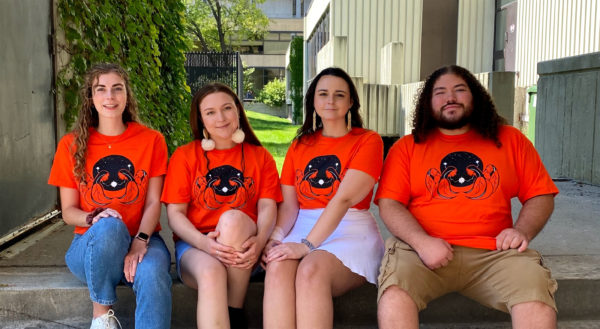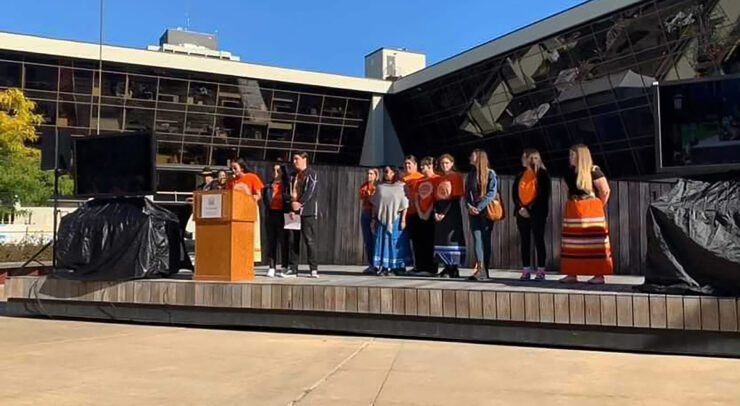“Throughout the year, there are numerous ways to ensure that you are engaging with Indigenous people and culture in a respectful manner.”
On Sept. 30, Canada marked the second National Day for Truth and Reconciliation (NDTR). The statutory holiday commemorated the ongoing impact of the residential school system.
Sept. 30 was also Orange Shirt Day, coined in honour of Phyllis Webstad, founder of the Orange Shirt Society. Wearing an orange shirt is meant to generate meaningful discussions about the legacy of Residential Schools while symbolizing that “Every Child Matters.”
At the University of Ottawa (U of O), the Indigenous Law Student Governance (ILSG) decided to create and sell their own orange shirt. The campaign gave U of O students the opportunity to observe Orange Shirt Day while raising money for an important cause.
“We had an alumni named Mary McPherson; she’s from Thunder Bay originally but she’s a member of Couchiching First Nation, and she developed the design on our t-shirt. And then we had it manufactured by Brandigenous, which is an Indigenous-owned manufacturing, screen printing company,” explained Polsia Carrozza, a 3L student in the Programme de Droit Canadien and member of the ILSG executive.

“The shirts sold about, I would say maybe three-quarters of the shirts in the pre-sale, and then we were in front of Fauteux [Hall] on the 28, 29 and 30 [of Sept.] … to give out the shirts of the pre-sale, sell the remaining shirts and collect donations … direct donations are all going to the Indian Residential Schools Survivors Society. That’s an organization we picked because they’re national in scope.”
In tandem, profit from the t-shirt sales will help the ILSG improve their programs.
“Half of this [t-shirt sales] will also go to IRSSS, and then the other half we’re basically keeping at ILSG. We provide beading materials to our students, so they don’t have the burden of that cost if they want to do the craft that they love. We also provide meals at our meetings. That’s a really important thing for Indigenous people,” added Carrozza.
In addition to the ILSG, the Indigenous Students Association (ISA), and the Mashkawazìwogamig Indigenous Resource Centre (IRC) hosted events ending with a ceremony at University Square on the morning of Sept. 30.
“Our team decided to do a full week of events this year, in hopes people could participate in various learning opportunities leading up to the main event on September 30th,” wrote Tareyn Johnson, director of Indigenous Affairs at the U of O, in an email to the Fulcrum.
“Some highlights included a two-day Orange Shirt beading workshop, a candlelight vigil to honour Joyce Echaquan and others who have lost their lives to colonial violence, and the main event in University Square on the morning of the 30th. Students had the opportunity to speak on stage at the main event to ensure their voices were heard by the university population and the head administration.”
Moving forward, Carrozza urged students to take small actionable steps toward Truth and Reconciliation.
“So, I guess one way to carry the momentum forward is just going beyond Sept. 30. Are you an ally beyond that, you know? You don’t just have to read the TRC calls to action on [the NDTR]. You can implement that in your day-to-day.”
Though, she said the U of O and the faculty of law also have a part to play.
“Mostly we’re aiming that towards our institution, towards the faculty of law and university in general. They have an obligation to … implement the calls to action and then to ensure that students are educated on the history of residential schools, but also that Indigenous students specifically are well supported. So that’s kind of what we’re hoping will go beyond Sept. 30.”
Additionally, Johnson encouraged students and staff to educate themselves and contribute to better Indigenous representation.
“Please invest time in research and reading about Indigenous people and voices. When purchasing orange shirts or other products, please be sure to buy from Indigenous artists and businesses. Include Indigenous content and people in courses and planning, choose Indigenous television and film, and support Indigenous events. ”
Click here to read the U of O’s Indigenous action plan.





